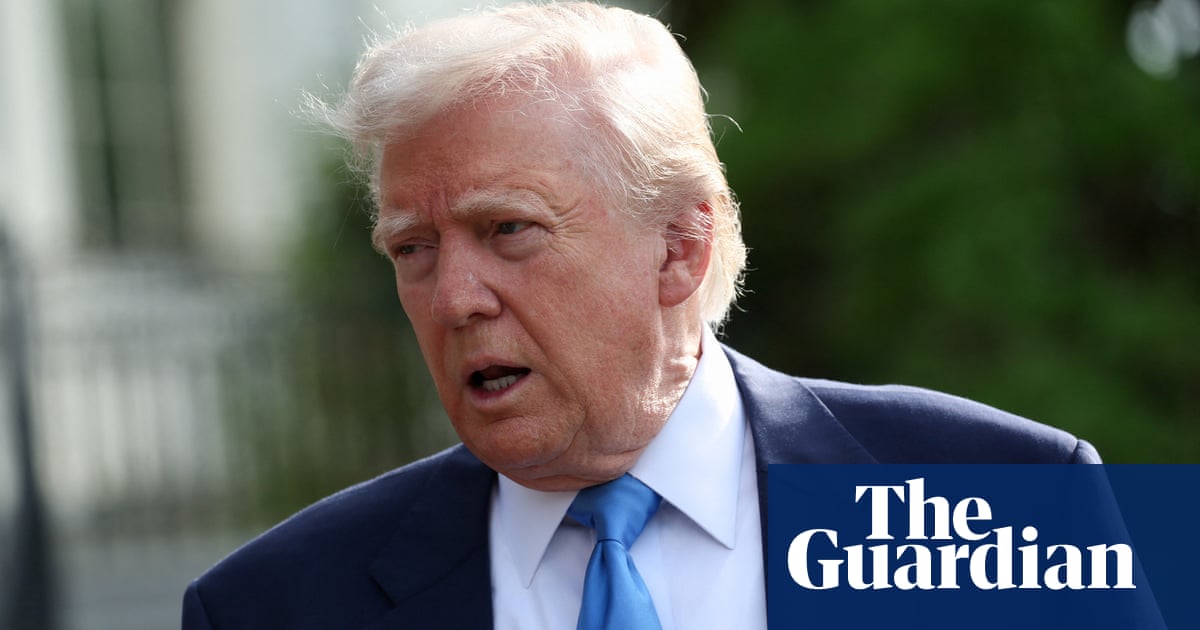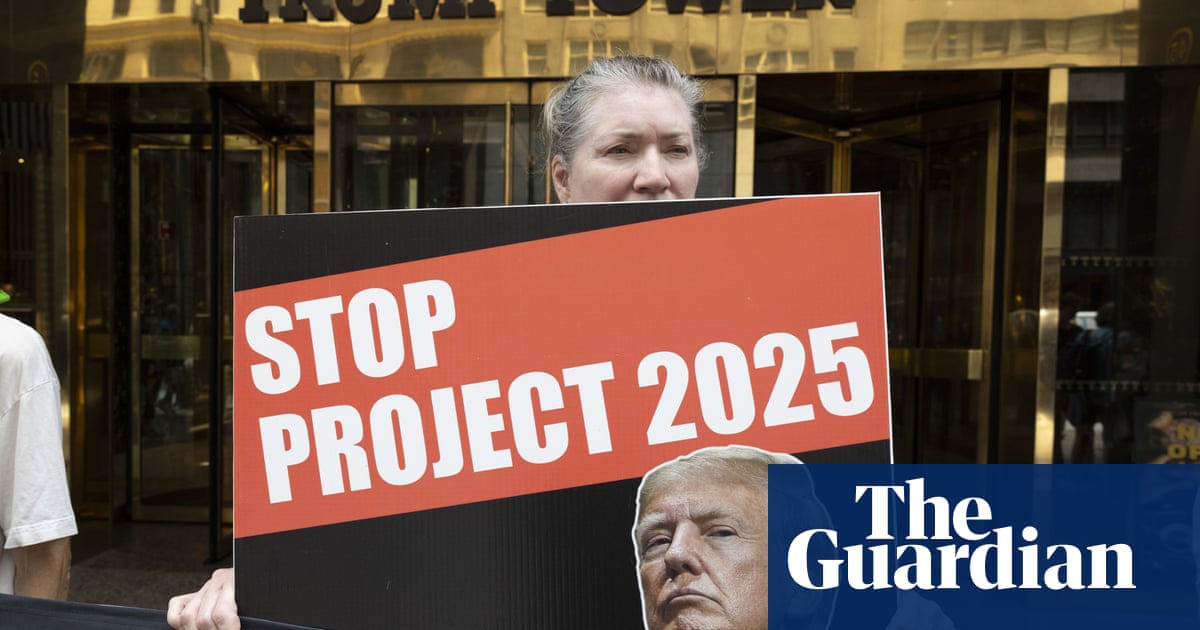It is no laughing matter. The annual dinner for journalists who cover the White House is best known for American presidents trying to be funny and comedians trying to be political. But this year’s edition will feature neither.
Instead the event in a downtown Washington hotel on Saturday night will, critics say, resemble something closer to a wake for legacy media still trying to find an effective response to Donald Trump’s divide-and-rule tactics and the rise of the Maga media ecosystem.
Joe Biden’s effort to restore norms included the former president giving humorous speeches at the White House Correspondents’ Association (WHCA) annual dinner. But just as in his first term, Trump will not be joining the group he has long branded “the enemy of the people” and most of his staff are expected to boycott.
News outlets, including the Guardian, will be present but there will also be another major gap this year. The WHCA had lined up the comedian and writer Amber Ruffin but last month withdrew her invitation. Eugene Daniels, president of the association, wrote in an email: “I want to ensure the focus is not on the politics of division but entirely on awarding our colleagues for their outstanding work and providing scholarship and mentorship to the next generation of journalists.”
Ruffin had referred to the Trump administration as “kind of a bunch of murderers” on a podcast the previous week and asserted that “nobody wants” Trump to attend the dinner. The WHCA may have been seeking to avoid a repeat of the 2018 dinner in which the comedian Michelle Wolf savaged Trump administration officials sitting just feet away and was condemned by some for going too far.
But critics described the decision to drop Ruffin as an exercise in capitulation and cowardice, a metaphor for the failure of the media to unite around a strategy to push back against Trump’s all-out assault. Since returning to office he has seized control of the pool of journalists that follows the president, barred the Associated Press news agency from the Oval Office and handed access and prominence to far-right influencers.
Kurt Bardella, a political commentator, NewsNation contributor and former Breitbart News spokesperson, said: “I expect that for those who attend the dinner this year it’s going to just be a collective bitch fest of the Washington legacy media that has been completely neutered and embarrassed during this time of Trump.
“The idea that there would be this gathering of self-proclaimed media elites who on their watch have been completely dismantled, whose parent companies have all kissed the ring at this point, it’s like, what are you celebrating, exactly? I’m not entirely sure.”
The media were unified in fact-checking Trump during his first term, Bardella argued, whereas now the ecosystem is radically different, for example with the Trump ally Elon Musk in control of the X social media platform and the Washington Post owner, Jeff Bezos, ordering that the newspaper narrow the topics covered by its opinion section to personal liberties and the free market.
Bardella added: “I would get it if it was the White House correspondents’ party thrown by Fox News or Steve Bannon and Tucker Carlson and Megyn Kelly and Charlie Kirk and Ben Shapiro and Joe Rogan were throwing a big party. But for the traditional legacy media to throw this parade of parties is almost embarrassing.”
The first White House correspondents’ dinner was held in 1921. Three years later Calvin Coolidge became the first president to attend and all have since except Trump. In 2006 the comedian Stephen Colbert roasted George W Bush and the media over the lack of weapons of mass destruction in Iraq. In 2011 Barack Obama mocked a stone-faced Trump and even displayed a pastiche of what the White House would look like if the reality TV star became president one day.
The event also allows the WHCA to present reporting awards, raise money for scholarships and celebrate the constitutional first amendment that protects freedom of speech. During Trump’s first term the speakers included the Watergate journalists Carl Bernstein and Bob Woodward and the historian Ron Chernow, who warned: “When you chip away at the press, you chip away at our democracy.” Saturday’s version is again likely to take a sober tone for a sobering time.
Steve Clemons, editor at large of the National Interest and a guest at numerous WHCA dinners, said: “It’s not going to be as much fun. We’re going to see a tribute to quality journalism and there’s always a place for that but there’s a toxicity out there that is hard to ignore at this moment. In a way we all need to take a break for a year and see if we can get to a better place next year.”
Clemons supports the WHCA’s decision to revoke Ruffin’s invitation. “You can’t use the dinner as a reason to do battle with the president,” he said. “When you have a comedian that goes out and says nobody wanted the president there that’s a real problem. That’s a dismissive and disrespectful position that the White House Correspondents’ Association cannot take, no matter what its grievances or problems are in working out the terms of trade.
“You can’t create something that is institutionally biased against the presidency. That’s not our job. It’s not journalism’s job. Journalism is to report on the White House and the president in a fair and objectively distant way what’s going on. That exercise of having that comedian, if we’d gone through it, was not anything connected to the qualities of fair and objective journalism and celebrating the first amendment.”
The WHCA, which is not a formal trade union, has an unenviable task. Its members are diverse, spanning wire service and newspaper reporters, photographers and TV and radio journalists from the US and countries all over the world. They work for outlets of all political stripes and inevitably hold conflicting views on whether to aggressively tackle Trump head-on or lie low and hope to wait out the storm.
The association’s annual dinner could be a moment to regroup, renew a shared sense of purpose and gain brief respite from the relentless grind of the Trump beat. But it might just as easily prove a gloomy affair, full of chatter about declining relevance and failing strategies for combating Trump’s war on truth. And whereas celebrities were clamouring for a seat during the Obama years, the dinner has arguably also lost some of its glamour.
Sally Quinn, an author, journalist and socialite, said: “I will never, ever, ever go to the White House correspondents’ dinner again because it’s the worst event in Washington every year. First of all, there are too many people in the Hilton Hotel; there are like 3,000 people jammed in; it’s like being in the subway in Manhattan at rush hour with bad food and bad jokes.
“You stand in line forever and ever to get your ticket. Last year I was in line with the British ambassador in the rain because the line went all the way outside and we stood there and stood there and stood there and it was a nightmare.”
For Quinn, the widow of Ben Bradlee, former editor of the Washington Post, the lack of an entertainer at the dinner is no great loss because there is not much to laugh at in Washington right now.
“Everyone’s scared,” she said. “You’re scared you’re going to get thrown in jail if you write something he doesn’t like and that’s going to happen very soon.
“Then you have the owners of these news organisations who keep keeling over and bending the knee so you’ve got all these people in the media who are quitting in protest. It’s a horrible time to be covering Trump. If you’re a journalist and you want to be on the story, this is the story to cover, but people are not having fun covering it. It’s very intense and very upsetting.”

 German (DE)
German (DE)  English (US)
English (US)  Spanish (ES)
Spanish (ES)  French (FR)
French (FR)  Hindi (IN)
Hindi (IN)  Italian (IT)
Italian (IT)  Russian (RU)
Russian (RU)  7 hours ago
7 hours ago
























Comments